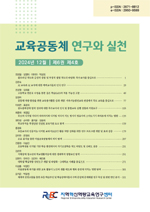공동체 역량 함양을 위한 교육봉사활동 강좌 개발: 지속가능발전교육 관점에서 독도 교육을 중심으로
A Study on the development of educational volunteer activity course to cultivate community capacity: Focusing on Dokdo education from the perspective of sustainable development education
- 부산대학교 지역혁신역량교육연구센터
- 교육공동체연구와실천
- 제6권 제4호
-
2024.1277 - 104 (28 pages)
-
DOI : 10.23108/decrc.2024.6.4.77
- 4

연구목적: 본 연구의 목적은 공동체 역량 함양을 위한 교육봉사활동 강좌를 개발하는 것이다. 연구방법: 본 연구 방법은 문헌 연구로 ADDIE 모형과 봉사 학습 이론을 기반으로 교육봉사활동 강좌를 개발하였다. 연구결과: 본 연구 결과로 분석 단계에서 현재 독도 교육의 문제점 분석을 토대로 지속가능발전교육 관점에서 독도 교육 목적 도출, 설계 단계에서 지속가능발전교육 관점에서 독도 교육 목표 설정을 바탕으로 교육 내용과 교육 방법 설계, 개발 단계에서 교육봉사활동 비교과 강좌와 본 강좌의 개발, 실행 단계에서 교육봉사활동 강좌 실행, 평가 단계에서 교육봉사활동 강좌의 실행 과정에서 학습자 경험 탐색을 통해 도출된 문제점 반영하여 교육봉사활동 강좌의 보완이 이루어졌다. 논의 및 결론: 본 연구의 시사점으로 지속가능발전교육의 영역을 반영한 교육봉사활동 모듈 개발, 교원양성기관의 교육봉사활동과 연계한 중등학교의 교육 모델 개발을 제안하였다.
Purpose: The purpose of the study is to develop an educational volunteer activity course to cultivate community capacity. Method: This study developed an educational volunteer activity course based on the ADDIE model and service learning theory through literature research. Results: In the analysis stage, based on the analysis of the current Dokdo education problems, the purpose of Dokdo education was derived from the perspective of sustainable development education. In the design stage, educational content and methods based on education goal setting were designed. In the development stage, an educational volunteer activity extracurricular course and an educational volunteer activity main course were developed. In the execution stage, educational volunteer activity course was implemented. In the evaluation stage, students’ learning experiences were explored and reflected to supplement the educational volunteer activity course. Conclusion: This study proposed the development of an educational volunteer activity modules according to the areas of sustainable development education, and the development of an educational model for secondary schools linked to educational volunteer activity of teacher training institutions.
Ⅰ. 서 론
Ⅱ. 이론적 배경
Ⅲ. 연구 방법
Ⅳ. 연구 결과
Ⅴ. 결론 및 제언
참고문헌
(0)
(0)